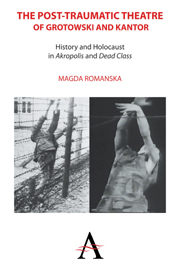 The Post-traumatic Theatre of Grotowski and Kantor
The Post-traumatic Theatre of Grotowski and Kantor from Part I - Our Auschwitz: Grotowski's Akropolis
Since Grotowski's death, there have been a number of attempts in Poland to stage Akropolis, either Wyspiański's or Grotowski's version. In April 2001 Akropolis was revived at Teatr Narodowy under the direction of Ryszard Peryt (set design by Ewa Starowieyska), who is better known as an opera director than a theatre director. Peryt's production was not successful. It stressed the national and religious character of the play while adding one more character from another Wyspiański play, Wyzwolenie [Liberation]. Konrad, a hapless, Polish Romantic hero who turns into Hector, Jacob and King David, contains in himself all of the major characters, thus unifying the plot structure of the play. Wyspiański took Konrad originally from Mickiewicz's Forefathers’ Eve, a Polish Romantic drama with undertones of the Hamletian dilemma of action versus inaction. Roman Pawłowski, writing in Gazeta Wyborcza, mocked Peryt's choice as an unfortunate attempt to reframe the national liberatory theology in a new European context (“Poland, the Christ of the nations, becomes Poland the Europe of the nations”), thus replicating the closed-minded pathos of the national–religious eschatology – something that, Pawłowski notes, both Wyspiański and Grotowski luckily escaped. “The difference between Wyspiański's work and Peryt's,” Pawłowski wrote, “is like the difference between the Bible and its radio talk-show interpretation.” He added:
Peryt does not look for contradictions in Wyspiański's work; he is not interested in the dialectic of apotheosis and mockery on which Grotowski [built] his spectacle. The drama which was an attempt to sum up the European civilization in one tradition of antiquity, Judaism and Christianity, in Peryt’s version becomes reduced to Polish Catholicism, a mistaken belief that all highest European values come from Poles.
To save this book to your Kindle, first ensure [email protected] is added to your Approved Personal Document E-mail List under your Personal Document Settings on the Manage Your Content and Devices page of your Amazon account. Then enter the ‘name’ part of your Kindle email address below. Find out more about saving to your Kindle.
Note you can select to save to either the @free.kindle.com or @kindle.com variations. ‘@free.kindle.com’ emails are free but can only be saved to your device when it is connected to wi-fi. ‘@kindle.com’ emails can be delivered even when you are not connected to wi-fi, but note that service fees apply.
Find out more about the Kindle Personal Document Service.
To save content items to your account, please confirm that you agree to abide by our usage policies. If this is the first time you use this feature, you will be asked to authorise Cambridge Core to connect with your account. Find out more about saving content to Dropbox.
To save content items to your account, please confirm that you agree to abide by our usage policies. If this is the first time you use this feature, you will be asked to authorise Cambridge Core to connect with your account. Find out more about saving content to Google Drive.